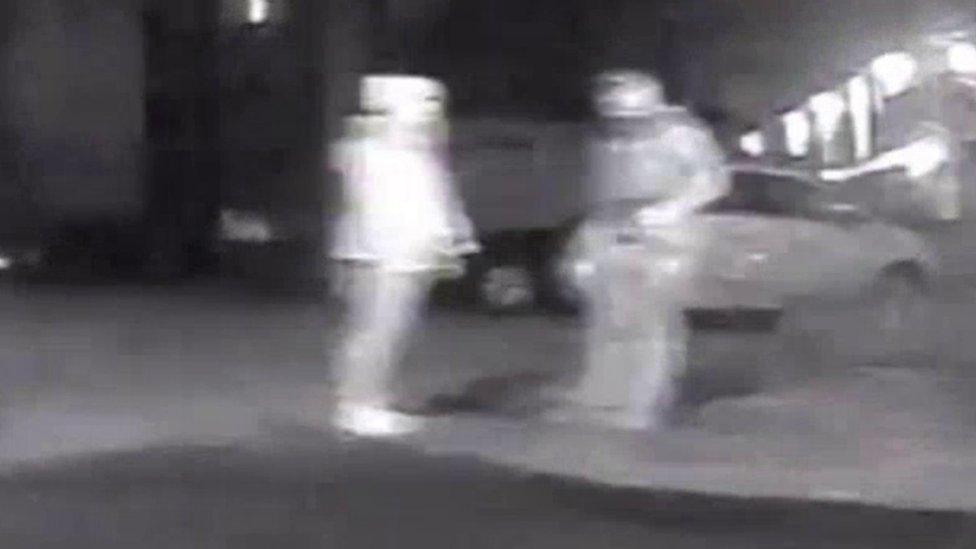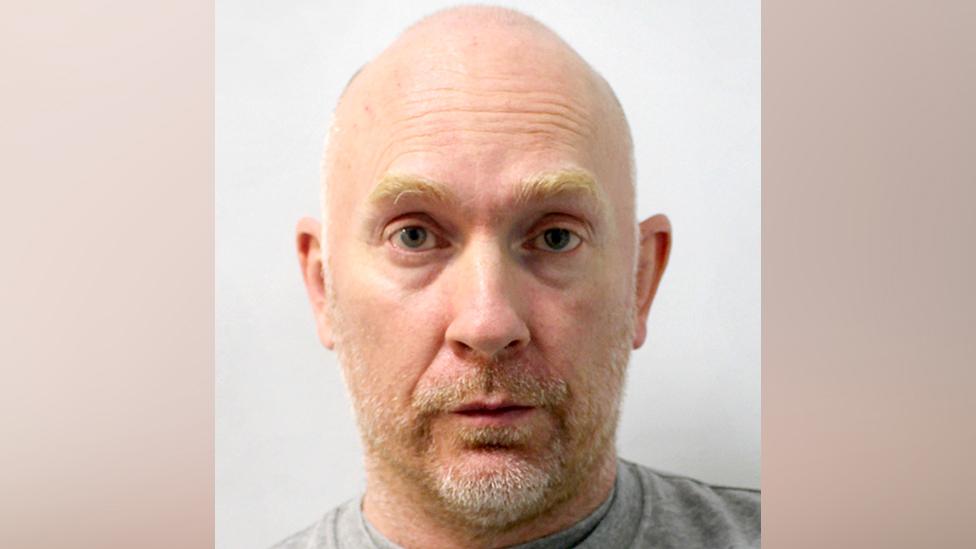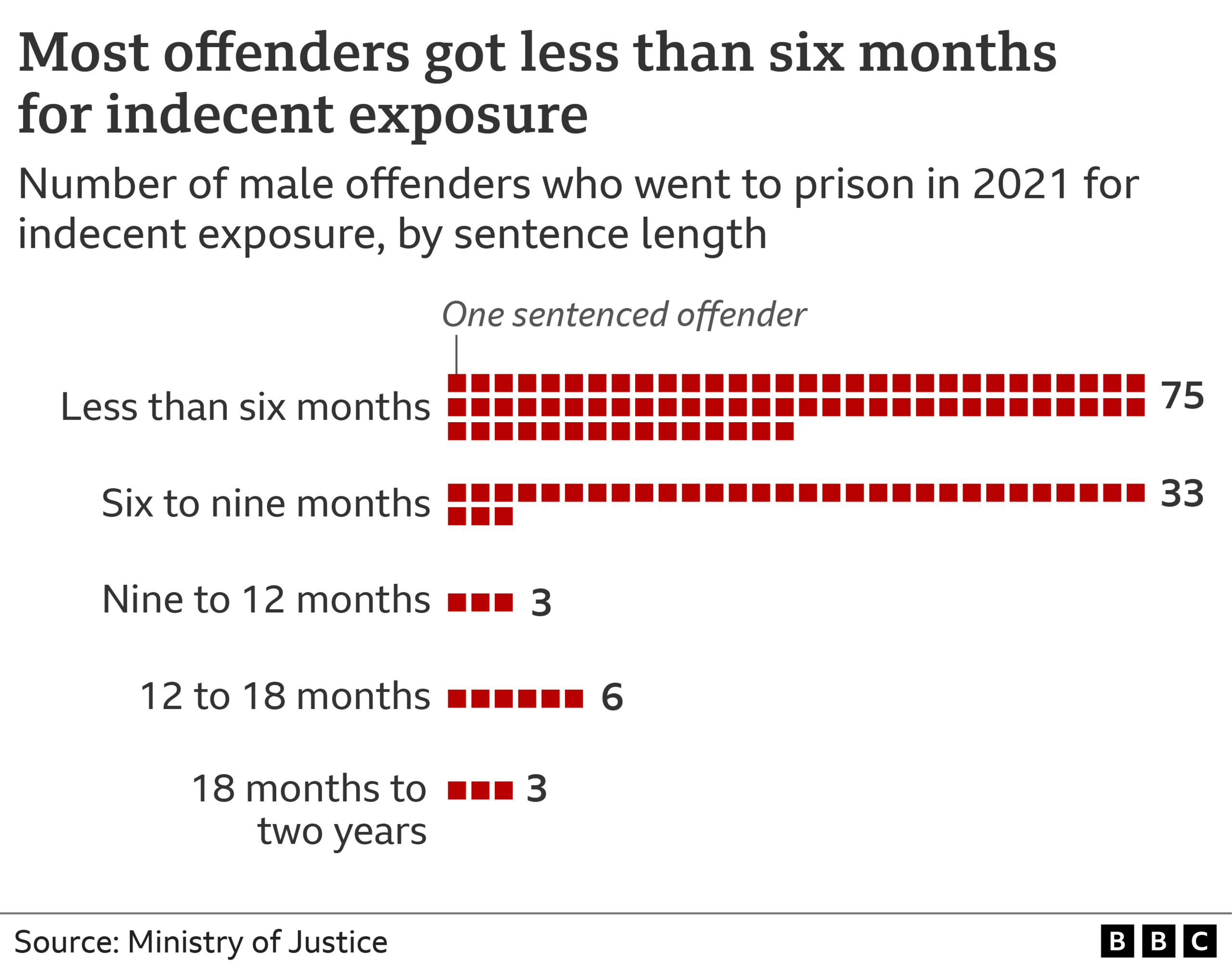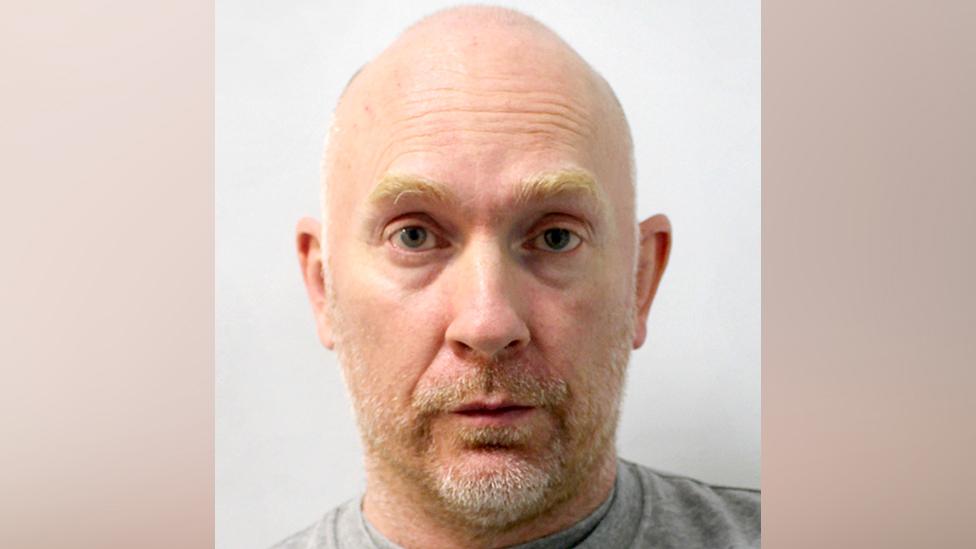Wayne Couzens: Did indecent exposure warn of murder?
- Published

CCTV footage played in court showed Couzens, using his position as a police officer, to stop Sarah Everard
Wayne Couzens, the ex-police officer who used his position to trick his way to raping and murdering Sarah Everard in March 2021, is returning to court this week to be sentenced for indecent exposure.
Couzens will never leave prison. That means the real questions now are whether these earlier offences should have identified him as a violent threat to women - and what his case tells us about so-called flashers going on to commit far more serious sexual offences.
Drive-thru incidents
Before Couzens killed Ms Everard, detectives have identified six incidents of indecent exposure linked to him - he has pleaded guilty to three, while the others will lie on his file.
The first of those was in June 2015, when Kent Police received a report of a man in a car in Dover exposing himself. A witness gave officers the car registration plate, which was registered to Couzens, then at the Civil Nuclear Constabulary. Yet officers took no further action.
Then, in November 2020, four months before the murder, a woman was cycling along a country lane in Deal, Kent, when a totally naked man stepped out of a wooded bank and looked straight at her.
She cycled away, but spotted a number plate of a parked car. That car belonged to Couzens, by now a Met Police officer. A later analysis of mobile phone data placed his phone in the area at the right time. This is one of the three incidents Couzens has admitted.
The two other admissions are part of four virtually identical allegations of escalating concern in the weeks before the murder.
CCTV shows moments before Couzens flashes drive-through workers
Couzens repeatedly visited a drive-thru restaurant and exposed himself to staff while sitting in his car, on one occasion while he was paying for food. The last incident was less than a week before Ms Everard disappeared.
So are these incidents relevant to Ms Everard's murder? Jennifer Grant is a criminologist who studies sex offenders, having worked with them previously as a probation officer.
The Portsmouth University academic says "it's a really complicated question to answer", but there is evidence that some men graduate from indecent exposure to serious sexual assaults and rape.
"There's long been a suggestion that indecent exposure is connected to anti-social behaviour more generally rather than a sexual motivation. And not everyone who exposes themselves is doing it to get sexual pleasure."
There is a group of offenders who are potentially violent because the way they expose themselves involves anger, and an apparent desire to frighten and control women they approach, she says.
The most reliable evidence comes from a 2014 United States study analysing data going back 30 years. It concluded that between 5% and 10% of men who commit "exhibitionist" crimes escalate to sexual assaults.
Without getting into the distressing details of what Couzens did, each of his exposure incidents places him in the category of a man seeking sexual control over his target.
"Couzens is clearly a worst-case," says Mrs Grant. "But there is a clear pattern of him gaining confidence and an increasing frequency of incidents. I saw this with some offenders who [over time] would be getting closer to victim."

Wayne Couzens admitted murder, kidnap and rape
So despite Kent Police having actionable evidence in 2015 - a car registration plate - why was the suspect not pursued?
Part of the answer to that lies in the disciplinary proceedings now taking place.
But the fact is that indecent exposure has historically, and culturally, been regarded by many as a "nuisance" offence rather than a sexual crime.
That's because its origins lie in the Vagrancy Act of 1824, external - a law aimed at cleaning squalid Georgian streets of "rogues and vagabonds".
That law was in place until 2003 - when Parliament finally recognised indecent exposure as a sexual offence. The maximum penalty went from three months in jail to two years.
Police in England and Wales recorded more than 13,000 incidents of indecent exposure and voyeurism in the year to September 2022. But the trend of annual charging and conviction rates is very low.

The most recent data shows that just 457 men were convicted and sentenced for exposure in 2021. Just 120 of them were jailed - and most were locked up for less than six months.
"If we don't charge and convict, then we cannot manage the sex offender," says Mrs Grant. "If we convict, then they're on the sex offenders register. There is an offender manager assigned to them in prison and a probation officer providing oversight on the outside.
"Even if they receive a minor sentence, the experience can have a huge deterrent effect."
Identifying Couzens
Which brings us back to the question of what any of this would have meant for Wayne Couzens.
A Kent police sergeant is facing a misconduct hearing over the handling of the 2015 indecent exposure allegation - while a former Metropolitan Police officer faces a gross misconduct hearing over how the February 2021 reports were dealt with.
A Home Office inquiry is also looking at whether there was a wider failure.
My straw poll of leading criminal barristers found that they all think Couzens would have been jailed or received a suspended sentence had he been convicted over the 2015 allegation - although the sentence would probably have been short.

But more importantly, his police career would have been over. He would never have made it into uniform in the Met Police.
Even if he had only been identified in 2020 or early 2021, the suspicion that he was offending would have enough to have him suspended.
The awful truth is we can't say that Couzens would not have gone on to rape and murder a woman because the crime he was committing would not have led to a sentence longer enough to control him forever.
But had he been caught and sacked, it would have meant that it would have been far harder for him to trick Sarah Everard into his car - ending her life in awful circumstances and causing untold damage to society's confidence in the police.


Have you been affected by the issues raised in this story? Tell us by emailing: haveyoursay@bbc.co.uk, external
Please include a contact number if you are willing to speak to a BBC journalist. You can also get in touch in the following ways:
WhatsApp: +44 7756 165803, external
Tweet: @BBC_HaveYourSay, external
Or fill out the form below
Please read our terms & conditions and privacy policy
If you are reading this page and can't see the form you will need to visit the mobile version of the BBC website to submit your question or comment or you can email us at HaveYourSay@bbc.co.uk, external. Please include your name, age and location with any submission.
- Published13 February 2023

- Published14 February 2023

